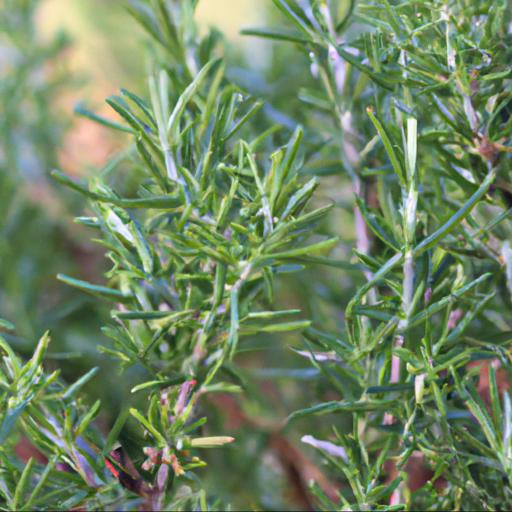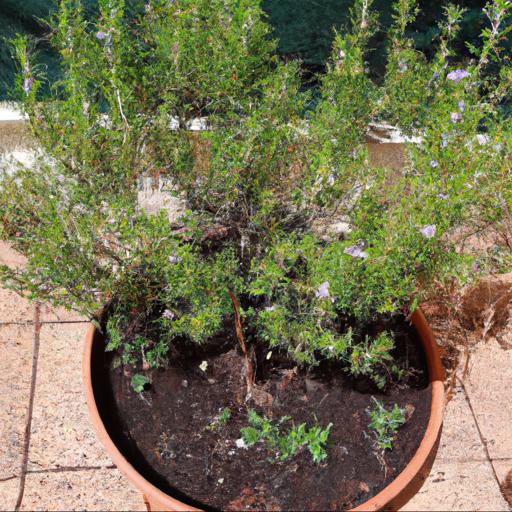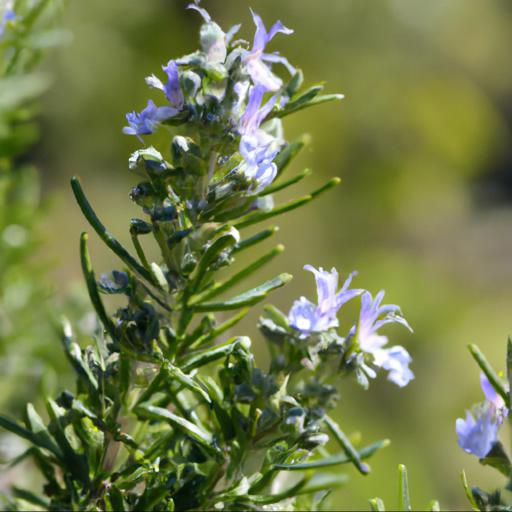Rosmarinus officinalis, commonly known as Rosemary, is an evergreen herb that is native to the Mediterranean region. It is widely used for its culinary and medicinal properties, and is known to have a variety of health benefits. Rosemary is a perennial herb with fragrant, needle-like leaves, and can be used fresh or dried.
It is a popular ingredient in many dishes, and is known to have anti-inflammatory, antioxidant, and antimicrobial properties. Studies suggest that Rosemary may help to reduce inflammation, improve digestion, and boost the immune system.
In this blog, we will explore the many uses and benefits of Rosemary, and discuss how to incorporate it into your diet and lifestyle.
Health benefits of rosmarinus officinalis

As a UK garden expert, I can tell you that Rosmarinus officinalis is an herbaceous plant which has countless amazing benefits to offer, both in terms of its culinary and health-promoting qualities. This perennial shrub is native to Mediterranean regions, and can be identified by its evergreen leaves, small white flowers and pungent aroma. The health benefits of Rosmarinus officinalis are quite impressive.
Not only does the herb provide antioxidant properties for the body, but its compounds may also aid in reducing inflammation, helping to protect against certain diseases and ailments. These compounds, including rosmarinic acid and carnosic acid, have been found to have antiviral, antibacterial, and antifungal effects.
The herb has also been linked with improved cognitive functioning, even being shown to slow age-related cognitive decline in animals. Furthermore, this herb is believed to help with improved digestion, as well as stimulating circulation and reducing fatigue. The herb’s one-of-a-kind aroma and flavor make it great for culinary use in many dishes, including ones with fish and potatoes.
It can be used fresh, dried, or frozen, to both enhance and compliment the dishes you make. There are many simple recipes that one can make with Rosmarinus officinalis, such as an exceptional salsa, or a refreshing lemon and rosemary drink.
The herb can also be used to make delicious herbal teas, which offer numerous benefits, such as reducing inflammation and relaxing the body. With its incredible health and culinary benefits, Rosmarinus officinalis is a great addition to any garden.
Whether you plan to use its fresh leaves, dried flowers or woody stems, it can make an excellent contribution towards preparing delicious and healthy dishes, as well as promoting superior health overall.
How to grow rosmarinus officinalis

Rosmarinus officinalis, or rosemary as it is more widely known, is a highly popular, evergreen plant that makes a great addition to any garden. It is a woody, perennial herb Famed for its unique and sweet scent, rosemary has a long association with cooking and medicinal use, as well as for its beauty and hardiness.
Rosemary is relatively easy to grow and with a few tips, you can ensure that you have a successful crop of this fragrant and versatile herb in your garden. The first step in growing rosemary is to select an environment with plenty of sunshine, preferably in an area that receives at least 8 hours of direct sunlight each day. Once you have chosen the right location, incorporate organic matter into the soil to improve drainage and aeration and then add a layer of mulch to retain water and keep the plant’s roots cool.
Next, soak your rosemary cutting in water for at least 15 minutes and then plant in well-drained potting soil and carefully water the soil. When it comes to fertilising, rosemary is a tough herb that doesn’t like too much fertilizer. Instead, opt for a natural fertilizer such as compost or an organic fertilizer to get a steady dose of nutrients.
Once planted and established, rosemary can withstand at least a mild drought, but it still needs consistent water and an occasional trim. To keep rosemary healthy, it’s important to prune the dead, ill, or overgrown branches and foliage so that the plant receives enough sunlight and airflow.
Growing rosemary doesn’t take a lot of effort, but when done properly and with the right care, you can expect a bountiful and fragrant harvest! With its earthy flavour and wonderful aroma, rosemary is sure to add a unique and enjoyable touch to all of your home cooked meals.
Uses of rosmarinus officinalis

Rosmarinus officinalis, or Rosemary, is an evergreen herb belonging to the mint family that has many culinary and medicinal uses. Native to the Mediterranean area, it is now cultivated throughout the world.
With its aromatic leaves and flowers, it is not only a great addition to the garden, but has many practical uses too. Rosemary can be used for many common ailments. As a herbal tea, it is believed to help digestion, soothe cramps, and relieve headache.
It is also used in creams as a topical treatment for muscle aches and pains. Additionally, its essential oil has antiseptic and astringent properties, which makes it useful in skin care.
Culinary uses for rosemary are just as plentiful. Its strong, pungent flavor adds to the taste of a variety of dishes, both savory and sweet. This herb is a key ingredient in Mediterranean cuisine, such as in the popular Italian dish spaghettini con rosmarino.
It can also be used to make a delicious butter, or to flavor olive oils, vinegars, and marinades. Furthermore, if you have rosemary plants in your garden, you can simply pick the leaves and flowers and throw them into salads, or use as an attractive garnish for any dish. In conclusion, using Rosmarinus officinalis in your garden offers so many potential uses – from medicinal and skin care purposes, to flavoring dishes and adding visual appeal.
It truly is an amazing and versatile herb.
Recipes featuring rosmarinus officinalis
As a UK garden expert, I’m often asked what to do with Rosmarinus officinalis, more commonly known as rosemary. Far more than just a fragrant addition to a potpourri, this hardy evergreen shrub can add notes of freshness and flavor to a variety of dishes.
Keep reading to discover some of my favorite recipes featuring this versatile herb!In its most basic form, rosemary can be used as a topping for focaccia bread or baked into crusty breads and biscuits for a hint of herbal flavor. You can add a sprinkle of dried rosemary along with some oregano, garlic, and Parmesan cheese for a savory Italian seasoning.
Fresh sprigs of rosemary can also be added to stews, soups, and sauces. Marinating meat and fish in a mixture of rosemary oil, lemon juice and salt is a fabulously fragrant way to add flavor.
You can even add a few springs of rosemary to pastas, omelets and potato dishes. For the sweet tooth, rosemary can be used to create a unique rosemary-infused honey. Simply combine honey, a cinnamon stick, a few slices of fresh ginger, and plenty of rosemary in a saucepan over low heat.
As the mixture simmers, it will infuse the honey with a delicious herbal flavor. This tasty condiment is perfect for drizzling over a warm bowl of oatmeal or yogurt.
For dessert, try rosemary-infused shortbread. Bake your favorite shortbread recipe using just a hint of rosemary for a pleasant herbal quality. Serve the shortbread with scoops of your favorite gelato for a delicious ending to any meal.
So the next time you find yourself with a bundle of fresh rosemary, don’t feel limited to just roasting or grilling meats. This versatile herb can add additional dimensions of flavor to sweet and savory dishes alike. With a bit of creativity,rosemary officinalis can transform any ordinary meal into a culinary delight!
Bottom Line
Rosmarinus officinalis, commonly known as rosemary, is an aromatic herb native to the Mediterranean region. It has many culinary and medicinal uses, and has been used for centuries to treat a variety of ailments. Rosemary is a powerful antioxidant, anti-inflammatory, and antimicrobial agent, and can help boost the immune system, improve digestion, and reduce stress.
It is also thought to have a positive effect on cognitive function, memory, and mood. Rosemary is a versatile herb that can be used in a variety of dishes, and is a great addition to any herbal remedy cabinet.
FAQ
What are the health benefits of Rosmarinus officinalis?
The health benefits of Rosmarinus officinalis include improved digestion, improved circulation, relief from headaches and migraines, improved cognitive function, and improved immune system health. It is also known to have anti-inflammatory, antioxidant, and antimicrobial properties.
What are the traditional uses of Rosmarinus officinalis?
The traditional uses of Rosmarinus officinalis include treating digestive issues, improving memory, relieving stress, reducing inflammation, and boosting the immune system. It is also used as an ingredient in cooking, as a fragrant oil, and as a medicinal herb.
How is Rosmarinus officinalis used in cooking?
Rosmarinus officinalis, commonly known as rosemary, is used in cooking as a seasoning for various dishes, such as soups, stews, sauces, and vegetables. It can also be used to flavor breads, meats, and fish. Rosemary is also used to make herbal teas and infusions.
What are the chemical constituents of Rosmarinus officinalis?
The chemical constituents of Rosmarinus officinalis include rosmarinic acid, carnosic acid, ursolic acid, oleanolic acid, caffeic acid, and flavonoids.
How does Rosmarinus officinalis affect the human body?
Rosmarinus officinalis, commonly known as rosemary, has been used for centuries for its medicinal properties. It is known to have anti-inflammatory, antioxidant, and antimicrobial effects on the human body. It can help improve circulation, reduce pain, and boost the immune system. It is also thought to improve cognitive function and memory, and may even help protect against certain types of cancer.
What are the side effects of using Rosmarinus officinalis?
The most common side effects of using Rosmarinus officinalis are nausea, vomiting, and diarrhea. It may also cause allergic reactions in some people, such as skin rashes, itching, and swelling. Additionally, it may interact with certain medications and should be used with caution in people with high blood pressure or other heart conditions.

